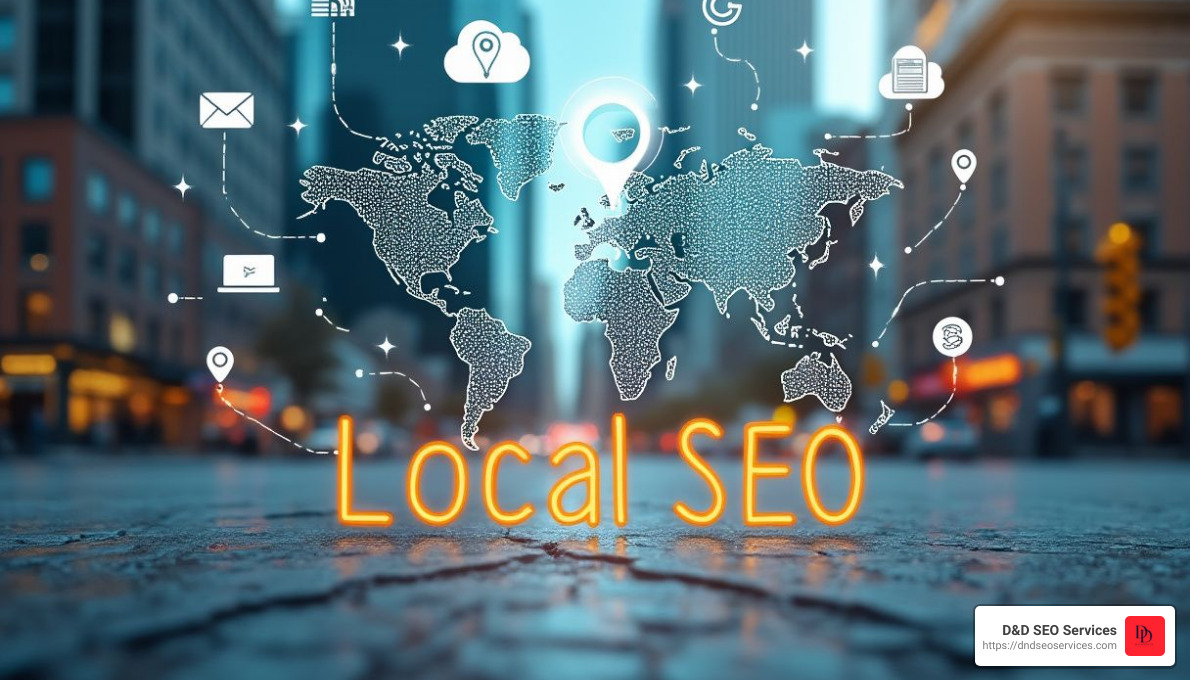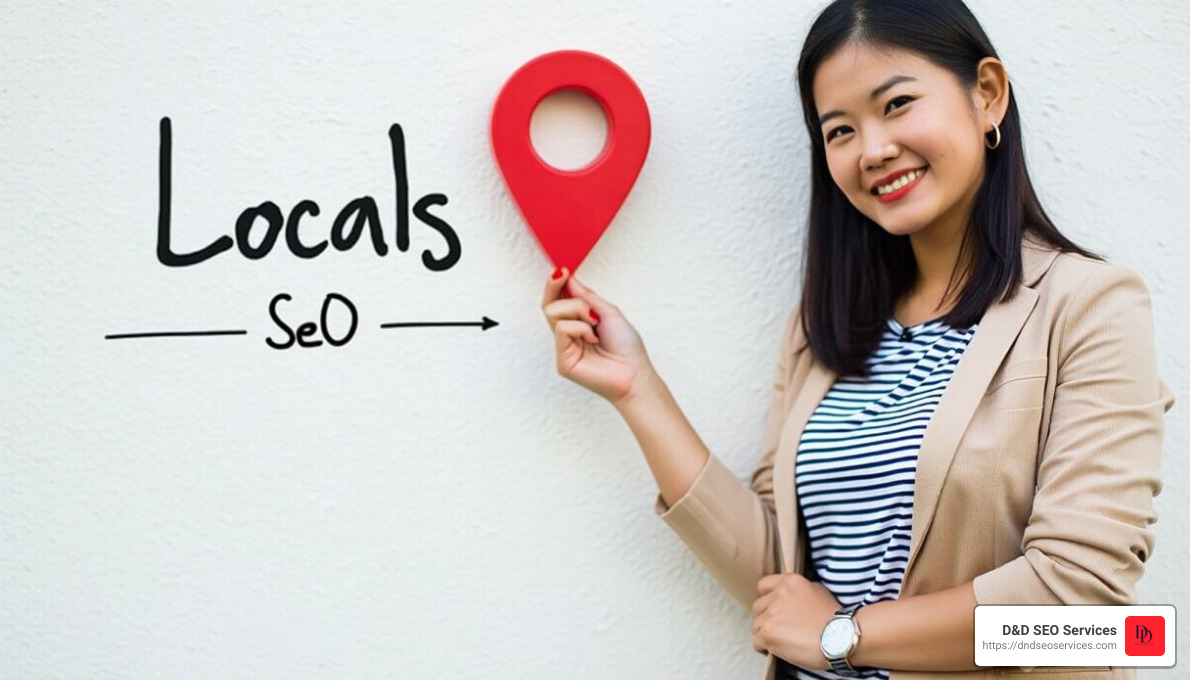Importance of Address for Google Rankings
Does having an address on your website impact your ranking on Google? The short answer is: Yes, it can.
- Addresses Build Trust: Listing an address makes your business appear more credible to both users and search engines.
- Local SEO Boost: Your address helps you rank better in local searches, making it easier for nearby customers to find you.
- Google My Business Synergy: Including an address can positively impact your Google My Business profile, enhancing visibility in local packs.
Address visibility on your website contributes to your overall search engine optimization (SEO) efforts by reinforcing your business’s credibility, especially in local searches. Having a clear address makes it easier for Google and other search engines to verify your business, which can improve your rankings. The visibility of your address can also boost your rankings in the local pack, making you show up when potential customers search for services in your area.
As a SEO expert and founder of D&D SEO Services, I’ve dedicated my career to helping small businesses thrive online. With over a decade of industry experience, I have witnessed how something as simple as including an address can significantly affect a business’s online presence. By understanding the role of an address in SEO, we can better optimize our strategies to help you attract local customers and boost sales.
Now, let’s dive deeper into the nitty-gritty of how having an address on your website impacts your ranking on Google and explore key factors that contribute to this effect.
Relevant articles related to Does having an address on your website impact your ranking on Google?:
- local on-page seo for multi-location
- on page local seo
- why on page seo matters for local businesses
Does Having an Address on Your Website Impact Your Ranking on Google?
The Role of Address in Local SEO
Having an address on your website is crucial for local SEO. It helps search engines like Google understand where your business is located, which is essential for ranking in local searches. When users search for services near them, Google uses the addresses listed on websites to show relevant results.
Local Pack: The local pack is the box that appears at the top of Google search results, highlighting three businesses related to the search query. Your business is more likely to appear in this local pack if you have a visible address. A visible address can also ensure your business has a map pin and a driving directions button, which makes it easier for customers to find you.
Case Studies: Address Visibility and Ranking
Let’s look at some real-world examples to understand how address visibility impacts Google rankings.
Service Area Business
Service area businesses, like plumbers or electricians, typically travel to their customers rather than having customers come to them. According to Google’s guidelines, these businesses should hide their address if they don’t serve customers at their location. However, a study showed that when a service area business hid its address, it experienced a massive decline in rankings and a significant drop in calls.
When the address was added back, the rankings improved, and the local pack reappeared for main keywords. This suggests that even for service area businesses, having an address can positively impact local SEO.
Home-Based Business
Home-based businesses face a similar dilemma. Without a physical storefront, they might think it unnecessary to list their address. However, hiding the address can lead to poor local rankings. One home-based business saw a drastic improvement in local rankings and calls after adding their home address to their Google Business Profile (GBP).
While it is against Google’s guidelines to list a home address without proper signage, the improvement in rankings was undeniable. This highlights the importance of address visibility even for home-based businesses.
Ranking Factors
Several factors contribute to how having an address impacts your Google ranking:
- Relevance: Your address helps Google understand that your business is relevant to local searches.
- Distance: Google considers the distance between the searcher and your business. A visible address helps Google calculate this distance accurately.
- Prominence: Businesses with visible addresses often appear more credible, which can boost their prominence in local searches.
In conclusion, having an address on your website and Google Business Profile can significantly impact your local SEO and overall Google ranking. It helps you appear in the local pack, makes your business more credible, and improves your chances of being found by nearby customers.
Next, we’ll explore the key factors affecting Google ranking, including quality content, keyword optimization, and more.
Key Factors Affecting Google Ranking
Quality Content and Freshness
Quality content is the cornerstone of good SEO. Google prioritizes content that is informative, well-researched, and valuable to users. For example, a detailed guide on “how to fix a leaky faucet” will rank higher than a brief, superficial post on the same topic.
Content freshness also plays a role. Regularly updating your content signals to Google that your site is active and relevant. This can be as simple as revising older posts with new information or adding new sections.
Keyword Optimization
Keyword optimization involves strategically placing relevant keywords throughout your content. This helps search engines understand what your page is about.
- Keyword placement: Include keywords in your title tags, meta descriptions, headers, and body text. For example, if your keyword is “Boston furnace repair,” it should appear naturally in these elements.
- Keyword density: Avoid keyword stuffing. Instead, aim for a natural integration of keywords. A good rule of thumb is to keep the keyword density between 1-2%.
Backlinks and Their Quality
Backlinks are links from other websites to your site. They act as votes of confidence, signaling to Google that your content is trustworthy and authoritative.
- High-quality backlinks: Aim to get links from authoritative sites in your industry. For example, a link from a reputable home improvement blog can boost your rankings.
- Toxic backlinks: Links from spammy or irrelevant sites can harm your SEO. Use tools to identify and disavow these toxic backlinks.
Technical SEO: Page Speed and Mobile-Friendliness
Page speed is crucial for both user experience and SEO. Google estimates that as load speed goes from one to three seconds, the probability of a visitor bouncing grows by 23%.
Mobile-friendliness is also essential. With Google’s mobile-first indexing, the mobile version of your site is used for indexing and ranking. Ensure your site has a responsive design that works well on all devices.
Core Web Vitals and Site Architecture
Core Web Vitals are a set of metrics related to speed, responsiveness, and visual stability. These include:
- Largest Contentful Paint (LCP): Measures loading performance. Aim for LCP to occur within 2.5 seconds.
- First Input Delay (FID): Measures interactivity. Aim for FID to be less than 100 milliseconds.
- Cumulative Layout Shift (CLS): Measures visual stability. Aim for a CLS score of less than 0.1.
Site architecture should be clean and easy to steer. Use a logical structure with clear categories and internal links to help both users and search engines understand your site.
Next, we’ll explore the impact of physical location on Google ranking, including server location and loading speed.
The Impact of Physical Location on Google Ranking
Server Location and Loading Speed
Server location can impact your website’s loading speed and, consequently, your Google ranking. When your server is closer to your users, data travels faster, reducing latency and improving load times.
- Server proximity: If your target audience is in Boston, hosting your website on a server located in the U.S. will typically result in faster loading times compared to a server in Europe or Asia.
- Loading times: Google uses page speed as a ranking factor. Faster websites provide a better user experience and are more likely to rank higher in search results.
To illustrate, imagine two websites offering furnace repair services in Boston. One is hosted on a local server, while the other is hosted overseas. The local server site will generally load faster, providing a better user experience and potentially ranking higher on Google.
User Experience and Ranking
User experience (UX) is another critical factor in Google’s ranking algorithm. A positive UX can lead to higher user engagement and lower bounce rates, both of which can boost your SEO.
- User engagement: Engaged users are more likely to spend time on your site, interact with your content, and convert into customers. Google tracks metrics like time on page and pages per session to gauge user engagement.
- Bounce rate: This metric measures the percentage of visitors who leave your site after viewing only one page. A high bounce rate can signal to Google that your site isn’t meeting user expectations, potentially harming your ranking.
For example, if a user searches for “furnace repair Boston” and lands on a slow, unresponsive site, they’re likely to leave quickly, increasing the bounce rate. Conversely, a fast, user-friendly site will encourage visitors to explore more, signaling to Google that the site is valuable and relevant.
By optimizing server location for faster loading speeds and focusing on user experience, you can improve your Google ranking and better serve your audience.
Next, we’ll address some frequently asked questions about address and Google ranking, including whether URL affects SEO.
Frequently Asked Questions about Address and Google Ranking
Does URL Affect SEO?
Yes, URL structure can impact your SEO. Both old and new URLs have their own sets of advantages and challenges.
-
Old URLs: If your website has been around for a while and has accumulated backlinks and authority, changing the URL can disrupt this. Google may take time to re-index the new URLs, leading to a temporary drop in rankings.
-
New URLs: When creating new URLs, it’s important to make them keyword-rich and descriptive. For example, “furnace-repair-boston” is better than “service123.” This helps both users and search engines understand the content of the page.
Keyword inclusion in URLs can also help. While not a major ranking factor, having keywords in your URL can improve click-through rates by making the link more appealing and relevant to search queries.
Does Location Affect Google Ranking?
Server location does affect Google ranking, primarily through its impact on loading speed.
-
Server proximity: If your target audience is in a specific location, hosting your website on a server close to that audience can improve load times. For example, a server in Boston will deliver content faster to users in Boston compared to a server in Europe.
-
Loading speed: Google considers page speed as a ranking factor. Faster websites offer a better user experience, which can lead to higher rankings. Tools like Google PageSpeed Insights can help you assess and improve your site’s loading speed.
What Makes Your Website Rank on Google?
Several key factors contribute to how well your website ranks on Google:
-
Content Quality: High-quality, relevant content is crucial. Google favors content that provides value to users. This includes well-researched articles, clear and engaging writing, and regular updates to keep the content fresh.
-
Keyword Optimization: Proper keyword placement in titles, headers, and throughout the content helps Google understand what your page is about. However, avoid keyword stuffing, as it can lead to penalties.
-
Backlinks: High-quality backlinks from reputable sources are essential for building authority. Google sees these links as votes of confidence in your content. Focus on earning backlinks from relevant, high-authority sites in your industry.
By understanding these factors and optimizing your website accordingly, you can improve your Google ranking and attract more organic traffic. Next, we’ll explore the impact of your physical address on local SEO and map rankings.
Conclusion
Summary
In this guide, we’ve explored the question: Does having an address on your website impact your ranking on Google? The answer is yes. Having an address on your website can significantly affect your local SEO and overall Google ranking. Our research and case studies show that adding an address can improve visibility, particularly for local search queries.
D&D SEO Services
At D&D SEO Services, we specialize in local SEO strategies custom to your business needs. Our team understands the importance of optimizing your website for local search, including the strategic use of addresses. We provide comprehensive SEO services to help you rank higher on Google and attract more local customers.
Final Thoughts
Adding an address to your website is a simple yet powerful way to boost your local SEO. It’s not just about appearing on Google Maps; it also helps build trust and authority with both users and search engines. While it’s one piece of the puzzle, it’s an important one.
SEO is an ongoing process that involves multiple factors. Quality content, keyword optimization, backlinks, and technical SEO elements like page speed and mobile-friendliness all play crucial roles. By focusing on these areas, you can improve your Google ranking and drive more traffic to your site.
If you’re ready to improve your local SEO and see real results, contact D&D SEO Services today for a free consultation. Let’s take your business to the next level.








